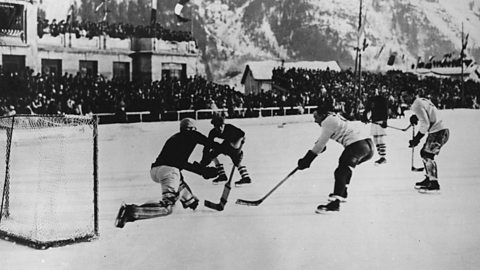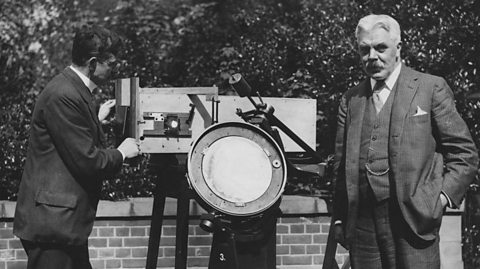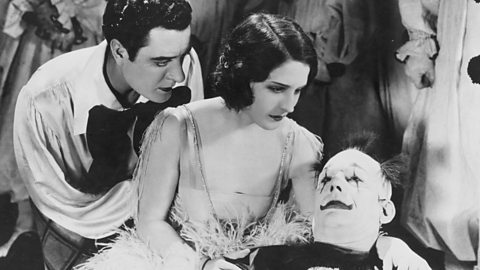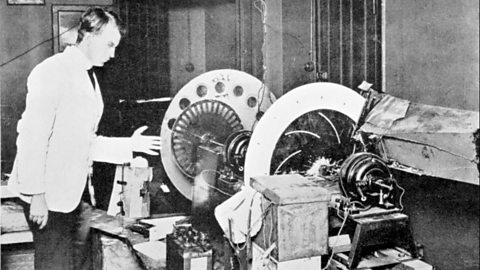Not only is 100 a pleasingly round number, age-wise it holds a surprising significance.
When an object reaches its first century - and ґуПуґ«ГЅ Bitesize has double-checked this with the experts - it officially becomes an antique.
We’ve taken a look at four things which are part of our everyday lives that turn 100 in the next 12 months.
The Winter Olympics: Going for cold
If the year ends in an even number, we get an Olympics (the postponed Tokyo Games in 2021 being an exception to the rule).
While all eyes will be on Paris in a few months from now for the summer version of the sporting spectacle, the Olympic movement celebrates the centenary of the winter Games in 2024 - the first of which also took place in France.
The story of winter sports at Olympic level is a little older than 100. Five years after the modern Games began in Athens in 1896, an international competition for winter sports - the Nordic Games - was first held in Stockholm, Sweden. The event would be held eight times between 1901 and 1926 with Stockholm hosting all but one of them (they went to Norway’s Kristiania - now known as Oslo - in 1903).

In the same era, it was suggested winter sports join the programme at what we now call the summer Games. Figure skating was included in London in 1908 and there were suggestions of Sweden either including more winter events when they hosted in 1912, or staging a separate event dedicated to the snowier, icier sports. It didn’t happen over concerns it would jeopardise the future of the Nordic Games.
Eventually, a winter Games recognised by the International Olympic Committee did happen. The first was in Chamonix, France, in 1924 - although it wasn’t officially known as the Winter Olympics at this stage. Norway topped the medals table at the hugely successful event. The Nordic countries (Sweden, Norway, Denmark, Finland and Iceland) dropped any previous objections to another festival of winter sports and by the time St Moritz in Switzerland hosted the Games in 1928, it was officially known as the second Winter Olympics - Chamonix retrospectively becoming the first. From 1994, the Winter Olympics has always been held in the even-numbered year between summer Games - originally, the two were staged in the same year.
The six pips: Greenwich helps us set our clocks
We’re not talking the ones that get stuck between your teeth. These are the distinctive set of beeps some radio stations play in the countdown to the hourly news, one per second from five seconds to the hour.
Their official title is the Greenwich Time Signal - or at least it was for the first 66 years of their existence. They were the idea of Frank Dyson who, in 1923, was the Astronomer Royal - a position created by King Charles II when the Royal Observatory was established and which dates back to 1675.

Dyson approached John Reith, the ґуПуґ«ГЅвЂ™s director general, in 1923. He was keen for time signals to be available to the public, and a broadcast of Big Ben chiming in the New Year proved so successful that the six pips followed soon after, sounding for the first time on 5 February 1924.
The pips were broadcast from Greenwich until 1939 when they moved to Surrey. In 1957, they moved again, to Sussex. The Greenwich Time Signal aired for the final time in 1990 and the ґуПуґ«ГЅ has been responsible for its own pips since then, from GPS satellite signals and a radio transmitter in Cumbria.
That first time signal from Greenwich may not have made a century, but it sprouted pips that have endured.
Metro-Goldwyn-Mayer: A lion of the cinema is born
The legendary image of a lion roaring from within a ribbon-like logo bearing the motto Ars Gratia Artis (Art for Art’s Sake) has been glimpsed before cinema hits such as The Wizard of Oz and Singin’ in the Rain. It means that the movie you're about to see comes from the studio Metro-Goldwyn-Mayer (MGM).
Formed in 1924, the story of the studio (and the lion logo) dates back a little earlier. Leo, as the lion became known, was originally the emblem of Goldwyn Pictures, a film-making company co-established by the producer Samuel Goldwyn in 1916.

In 1920, the film distributor Marcus Loew put money into Metro Pictures. Four years later it merged with Goldwyn Pictures and also Louis B Mayer Pictures. The studio became a powerful and influential presence in Hollywood, with the previously mentioned Louis B Mayer as its head. It became especially well-known for its lavish musicals and, later, the James Bond series of films. The very first film screened with the MGM logo was the intriguingly titled He Who Gets Slapped, based on a Russian play.
It’s one of many well-known studios that have, or are about to, mark their first 100 years. Warner Bros and Disney hit the milestone in 2023, while Columbia Pictures also celebrates its centenary in 2024.
The first television images: Magic on a small screen
Viewers of the Doctor Who 60th anniversary episode The Giggle will remember scenes in which television pioneer John Logie Baird transmitted a relatively high-resolution moving image of the puppet Stooky Bill from one room to another. That sequence was set in 1925, so why include it in this list?
It wasn’t quite the start of the story. The previous year, Baird made another TV breakthrough. The engineer had worked on a method of sending a beam of light through a disc, spinning incredibly fast, that was punched with holes. This allowed an image to be captured, transmitted and turned back into the original image at a receiver.

This game-changing technology wasn’t quite so flash in reality. One of Baird’s friends described a workshop where his invention was made from crates, biscuit tins, cardboard and darning needles, held together with string and glue rather than gleaming metal and solder.
And it worked. In 1924, Baird’s creation was able to display its first images. These were simple outlines, ranging from a An eight-pointed cross made up of four V-shaped arms of equal length. to letters of the alphabet. It was the beginnings of the road to Stooky Bill and with these first indications of what television was capable of, Baird was able to raise enough money to work in London - where his engineering with sound and pictures would be finessed.
It happened 100 years ago. In 2024, television officially becomes an antique.
This article was first published in December 2023.
Five things to learn in 2024
If you're thinking of making a New Year's resolution, ґуПуґ«ГЅ Bitesize is here to help with inspiration for five things to learn in 2024.

British gold medals that made history at the Winter Olympics and Paralympics
Iconic golden Games moments on snow or ice.

New Year traditions in the UK and around the world
First-footing, oliebollen and empty suitcases are all ways of seeing in 1 January
